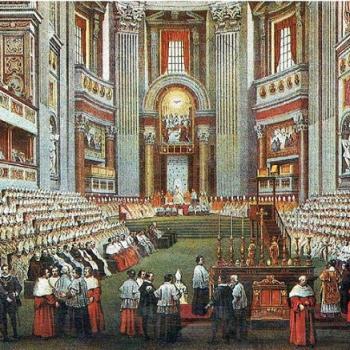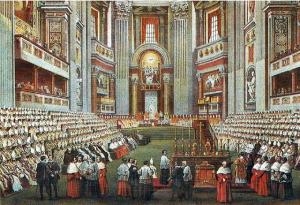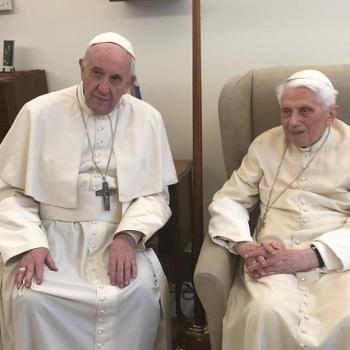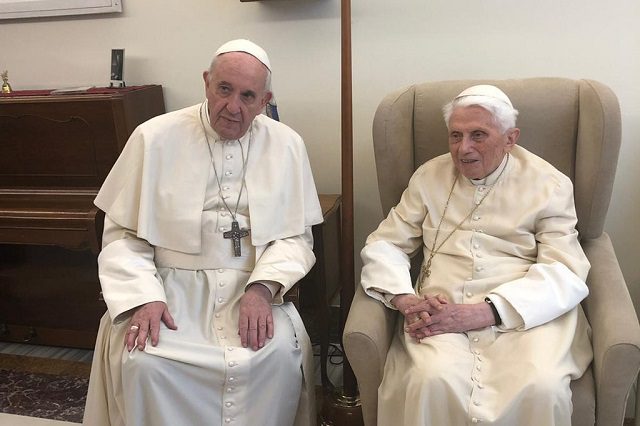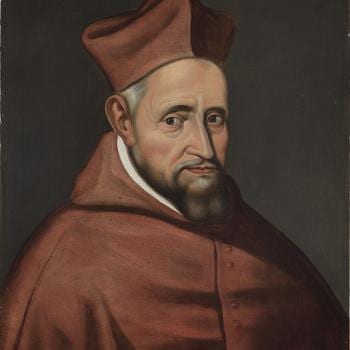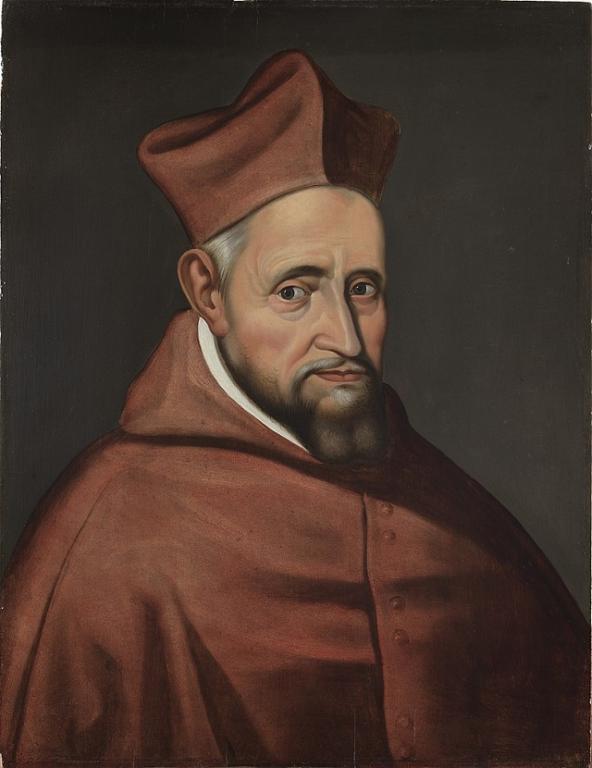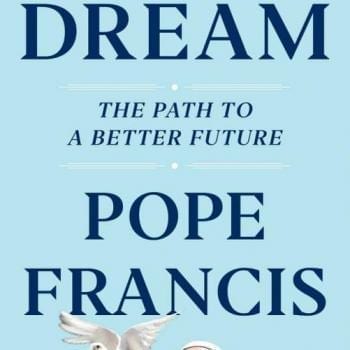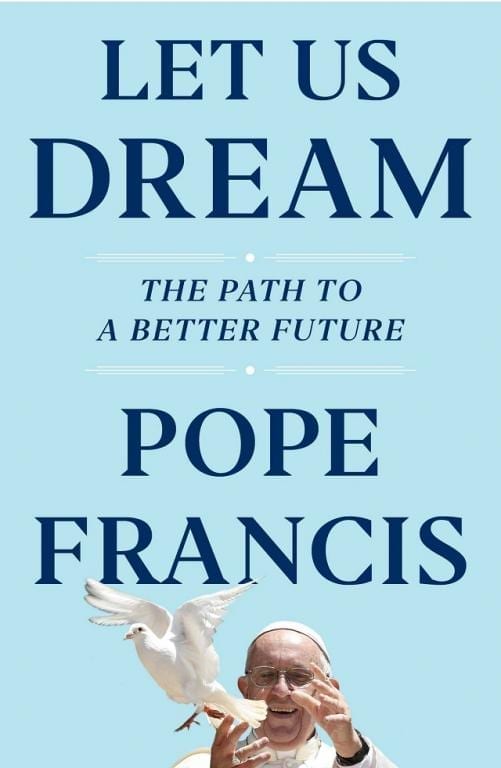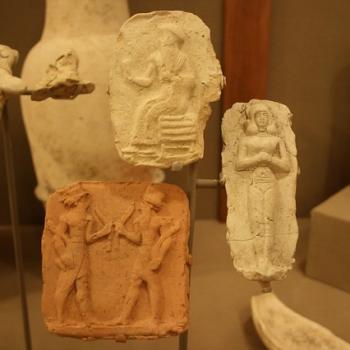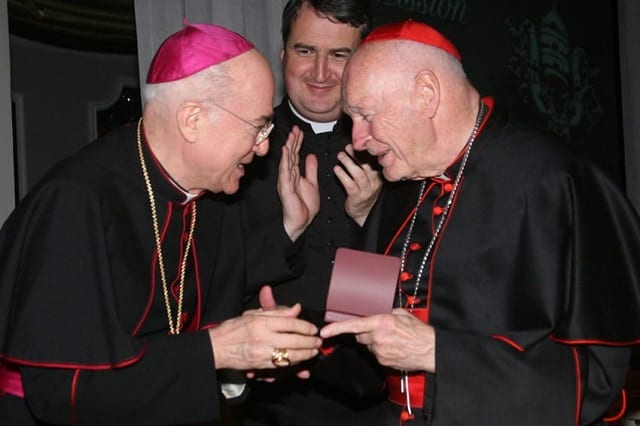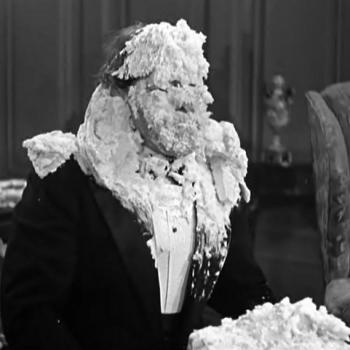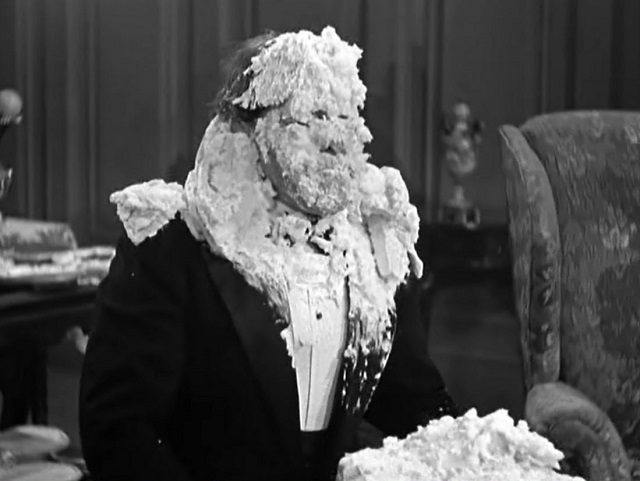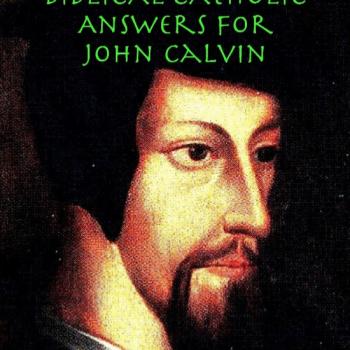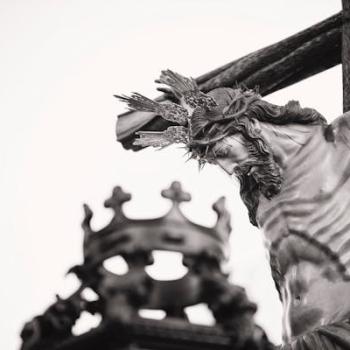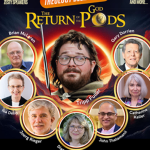Thank you for sharing Mr. Martignoni’s response, which I understand is one held by many Catholics today. Martignoni is correct that my opinion is not infallible, but neither is his. I never claimed that Vatican I defined the indefectibility of the Roman Pontiff. I believe, though, that it affirms this teaching in Pastor Aeternus, chapter IV, when it teaches that “in the Apostolic See the Catholic religion has always been preserved immaculate and sacred doctrine honored” (Denz.-H, 3066). In the same chapter of Vatican I, it is likewise stated that “this See of St. Peter always remains untainted by any error, according to the divine promise of our Lord and Savior made to the prince of the disciples: ‘But I have prayed for you that your faith may not fail; and when you have turned again, strengthen your brethren’ (Lk 22:32)” [Denz.-H. 3070]. The possibility of a heretical pope is likewise rejected by Vatican I, when it affirms that the “charism of truth and never-failing faith was conferred upon Peter and his successors in this chair in order that they may perform their supreme office for the salvation of all” [Denz.-H, 3071]. (emphasis [blue] added).
Ecumenical councils like Constantinople III can teach infallibly on matters of faith and morals. Constantinople III’s condemnation of Pope Honorius was not on a matter of faith and morals but on a matter of historical fact. Moreover, as Martignoni knows, Pope Leo II censured Honorius I for negligence rather than heresy. There is also the added complicated fact that Constantinople III affirmed a letter of Pope Agatho in session 4 (before its condemnation of Honorius in session 13), which teaches that the Apostolic See of Rome has always been immune from error. There seems to be an internal contradiction at Constantinople III. This contradiction, though, can be resolved if we understand that its condemnation of Honorius I relies upon a matter of historical interpretation, and is, therefore, not infallible. Moreover, Leo II qualifies the condemnation, and he censures Honorius I for negligence rather than heresy.
I respect Martignoni, but he has not at all convinced me that my understanding of Vatican I’s affirmation of papal indefectibility is wrong. I do agree with him that we need to give a benevolent interpretation of what Bishop Strickland and Cardinal Burke have said. They seem to assume that a pope can teach heresy. Well, that is their opinion, and their opinion is not infallible, and I argue that their opinion and that of Martignoni is not that of Vatican I. Unfortunately, the affirmation of papal indefectibility and the divine protection of popes from teaching heresy does not seem to be adequately understood today.
I (together with some other theologians) wrote to Cardinal Ladaria about this a few years back. We received a reply from the CDF’s undersecretary encouraging us to continue our work. This correspondence is confidential, but perhaps there will be some public intervention in the future. The Holy See is aware of the problems with Catholics accusing popes of heresy and has encouraged theologians to respond to these accusations. From the response I received, it seems that the CDF/DDF would prefer this problem be handled by Catholic theologians for now. There might be a clarification in the future, but I think Vatican I already is quite clear on the matter. The simple fact remains that the Magisterium has never affirmed that popes can teach heresy, and the letter of Pope Agatho and Vatican I seem to rule out that possibility. The case of Honorius does not argue against my position as I explain above and in the attached notes.
I don’t wish to engage in a discussion with Mr. Martignoni on this matter. I encourage him, though, to study these matters in greater depth.
On this the 750th anniversary of the death of St. Thomas Aquinas, we ask for his prayers.
Bellarmine (1542–1621) and Suárez (1548–1617) expressed their confidence in the protection of divine providence from there ever being a heretical pope. In fact they both came to believe there cannot be (non posse) such a heretical pope.
In Book 4, chapter 6, when speaking of the Pope as a particular person, Bellarmine maintains that “it is probable and can piously be believed that the Supreme Pontiff not only cannot err as a Pontiff, but also that as a particular person he cannot be a heretic, by obstinately believing something false contrary to the faith.”
Bellarmine then provides two proofs for this position. First, “because the gracious disposition of divine providence seems to require it. For the Pontiff not only should not but cannot preach heresy, but also should always teach the truth, and without doubt he will do that, since the Lord commanded him to confirm his brothers” (Nam Pontifex non solum non debet nec potest haeresim praedicare, sed etiam debet semper veritatem docere et sine dubio id faciet, cum Dominum illi juserit confirmare fratres suos). The second proof is from the events of the past (ab eventu): “Because there has never been a heretical pope up till now, or certainly it cannot be proved that any Pontiff was a heretic. Therefore, this is a sign that it cannot happen.” (ergo signum est, non posse esse).
The Jesuit theologian Francisco Suárez (1548–1617) argues that not only could God prevent a heretical pope from harming the Church, but by His divine providence it seems more likely that He would also insure that there would never be such a heretical pope. On whether a pope could fall into heresy, Suárez says: “Even though many affirm this as more probable, nevertheless to me (in brief) it seems more pious and more probable that a Pope could indeed err as a private person out of ignorance but not out of contumacy. For although God is able to prevent a heretical Pope from harming the Church, nevertheless it is more agreeable to the way of divine providence that—since God has promised that the Pope would never err in his definitions—He would insure that there would never be such a heretical Pope. And since up till now there has never been one in the Church, it should consequently be thought that, by the ordination and providence of God, there cannot be one.” De Fide, disp. 10, sect. 6, no. 10: Opera Omina, Vivès ed. Vol. XII, 319.
St. Alphonsus Liguori (1696–1787) agreed with Bellarmine, and he writes: “We ought rightly to presume as Cardinal Bellarmine declares, that God will never let it happen that a Roman Pontiff, even as a private person, becomes a public heretic or an occult heretic.” (Dogmatic Works of St. Alphonsus Maria de Liguori (Turin, 1848) Vol. VIII, p. 720).
What Bellarmine, Suárez, and Liguori believed could not happen seems to be confirmed by Vatican I’s affirmation of the “charism of truth and of never-failing faith” conferred upon Peter and his successors” (Denz.-H, 3071). How could a charism of “truth and never-failing faith” coexist with heresy?
Teachings of the extraordinary papal Magisterium are infallible as well as definitive judgments by the Pope. The question of the possibility of error in ordinary papal teachings is a delicate matter. Vatican I stated that “in the Apostolic See the Catholic religion has always been preserved immaculate and sacred doctrine honored” (Denz.-H, 3066) and the “See of St. Peter always remains untainted by any error” (Denz.-H, 3070). Ordinary teachings of the papal magisterium are not definitive and they are subject to revision or reform. This is why the Congregation for the Doctrine of the Faith in its 1990 instruction, Donum Veritatis, speaks of such magisterial teachings as pertaining to matters “per se not irreformable.”
If a papal teaching is not irreformable, it is subject to revision or change. For example, Pope Innocent I in 405 allowed for the use of judical torture by Christian magistrates. Nicholas I, however, in 866 taught that neither divine nor human law allows such torture (cf. Denz.-H, 648). Innocent IV, however, approved the use of torture by the Inquisition in 1252. In 1993, though, John Paul II included torture among the acts which are intrinsically evil (Veritatis Splendor, no. 80). We can look back and say that Popes Innocent I and Innocent IV were in error about torture, but they were not opposing any definitive teaching on the subject at the times when they made their judgments. Their judgments were not irreformable; and when they made these judgments they were not opposing any settled truths of the faith.
Bishop Gasser on Bellarmine and Vatican I Bishop Vincent Ferrer Gasser was the Bishop of Brixen in Austria. He was the author of the official Relatio of Vatican I.
Here is a key passage of that Relatio, which can be found on pages 58–59 of Bishop Vincent Ferrer Gasser, The Gift of Infallibility, translated with a commentary by Rev. James T. O’Conner (San Francisco: Ignatius Press, 2008):
As far as the doctrine set forth in the Draft is concerned, the deputation is unjustly accused of wanting to raise an extreme opinion, viz., that of Albert Pighius, to the dignity of a dogma. For the opinion of Albert Pighius, which Bellarmine indeed calls pious and probable, was that the Pope, as an individual person or a private teacher, was able to err from a type of ignorance but was never able to fall into heresy or teach heresy. To say nothing of the other points, let me say that this is clear from the very words of Bellarmine, both in the citation made by the reverend speaker and also from Bellarmine himself who, in BOOK 4, CHAPTER VI, pronounces on the opinion of Pighius in the following words: “It can be believed probably and piously that the supreme Pontiff is not only not able to err as Pontiff but that even as a particular person he is not able to be heretical, by pertinaciously believing something contrary to the faith.”
From this, it appears that the doctrine in the proposed chapter is not that of Albert Pighius or the extreme opinion of any school, but rather that it is one and the same which Bellarmine teaches in the place cited by the reverend speaker and which Bellarmine adduces in the fourth place and calls most certain and assured, or rather, correcting himself, “the most common and certain opinion.”
Bishop Gasser make it clear that the position (‘the fourth place”) of Bellarmine that the Council is endorsing is that of De Summo Pontifice, book IV, chapter VI, where Bellarmine refers to “the fourth proposition.” Here is what Bellarmine says in that chapter:
De Summo Pontifice, Book IV, chapter VI: On the Pope as a Particular Person:
The fourth proposition: It is probable and may piously be believed that not only as ‘Pope’ can the Supreme Pontiff not err, but he cannot be a heretic even as a particular person by pertinaciously believing something false against the faith. It is proved, first of all, because the sweet disposition of the providence of God seems to require it. For the Pope not only should not, but cannot preach heresy, but rather should always teach the truth. He will certainly do that, since the Lord commanded him to confirm his brethren, and for that reason added: “I have prayed for thee, that thy faith shall not fail,” that is, that at least the preaching of the true faith shall not fail in thy throne. How, I ask, will a heretical Pope confirm the brethren in faith and always preach the true faith? Certainly God can wrench the confession of the true faith out of the heart of a heretic just as he placed the words in the mouth of Balaam’s ass. Still, this will be a great violence, and not in keeping with the providence of God that sweetly disposes all things.
Secondly, it is proved ab eventu. For to this point no [Pontiff] has been a heretic, or certainly it cannot be proven that any of them were heretics; therefore this is a sign that it [i.e. a heretical pope] cannot happen. For more on this see Pighius.
What Bellarmine teaches in book IV, chapter 6 of De Summo Pontifice is clearly affirmed by Vatican I in Pastor Aeternus, chapter IV.
APPENDIX THREE
Alleged Papal Heresies Outline
*
Heresy is defined as “the obstinate denial or obstinate doubt after the reception of baptism of some truth which is to be believed by divine and Catholic faith” (1983 CIC, canon 751; 1917 CIC, canon 1325.2; CCC, 2089)
1) The case of Pope Liberius (in office 352-366)
Pope Liberius is sometimes criticized as an Arian or a Semi-Arian because of an ambiguous Christological formula he signed when under captivity by the emperor, Constantius, who favored Arianism. St. Athanasius, the greatest opponent of the Arian heresy, however, defended the personal orthodoxy of Liberius. In his History of the Arians, Part V, n. 41, St. Athanasius testifies to Liberius’ “hatred” of the Arian heresy as well as the pope’s support for him [Athanasius] as long as he was able “to exercise a free choice.” After the death of Constantius in 361, Liberius was a vigorous defender of Nicene Christology.
2) The Case of Pope Honorius I (in office 625-638)
1) From Fr. Ludwig Ott, The Fundamentals of Catholic Dogma trans. Patrick Lynch (St. Louis: Herder, 1958), p. 150 (p. 162 in the revised 2018 Baronius Press edition):
There is no doubt that Pope Honorius I (625-638) was personally orthodox. However, through his prohibition against speaking of two modes of operation he unwittingly favored the Monothelite error. The Sixth General Council wrongly condemned him as a heretic. Pope Leo II (682-683) confirmed his anathematization but not for the reason given by the Council. He did not reproach him with heresy, but with negligence in the suppression of the error. cf. DH 563.
The subsequent repetitions of the condemnations of Honorius I by Nicaea II and Constantinople IV, therefore, must be understood as condemnations for negligence rather than for heresy.
Pope John IV (r. 640–642) defended the orthodoxy of Pope Honorius I in his Letter Dominus quid dixit to the Emperor Constantine III in the spring of 641 (Denz- H. 43 th ed. 2012: 496-498):
[D-H 496] The Patriarch Sergius, of venerable memory, indicated to the aforesaid Pontiff of the city of Rome, [Honorius] of holy memory, that certain people were saying that there were two wills in our Lord and Redeemer, Jesus Christ. After having learned this, the aforesaid Pope wrote back to him that our Savior, as a total unity, was thus conceived and born in a miraculous way beyond any human order. Likewise, from the holy dispensation of his in the flesh, he taught that our Savior, as he was perfect God and perfect man, was born without sin so that he might restore the noble original state, which the first man lost through his transgression. Therefore, the second Adam was born, without having any sin, either by birth or by contact with men; and, in fact, the incarnate Word, in likeness to sinful flesh, assumed all that is ours without bearing any guilt of the sin arising from the inheritance of the transgression [etenim Verbum caro factum in similitudine carnis peccati omnia nostra suscepit nullum reatus vitium ferens ex traduce praevaricationis exortum].
[D-H 497] It was in this way, therefore, that …[Pope Honorius] evidently wrote [to Sergius], that, in our Savior, two contrary wills do not exist at all, that is, in his members [cf. Rom. 7:23], since he contracted no defect from the transgression of the first man….
But in order that no one, devoid of understanding, might reprove [Honorius] for seeming to speak only of a human nature and not also of a divine nature, … whoever disputes this should understand that the response was already made to the inquiry of the above-mentioned Patriarch. Furthermore, of course, the help of medicine is usually applied to the place where the wound is located For the blessed Apostle likewise is known to have done this often, adapting himself to the custom of his hearers; sometimes indeed when teaching about the supreme nature (of Christ), he is completely silent about the human nature; but sometimes when speaking of his human economy, he does not touch on the mystery of his divinity…
[D-H 498] Therefore, my aforementioned predecessor, while teaching on the mystery of Christ’s incarnation, said that there were not in him, as in us sinners, contrary wills of mind and flesh. Because certain people have transformed this to their own way of thinking, they have supposed that he taught one will of [Christ’s] humanity and divinity, which is completely contrary to the truth …
The great opponent of the Monothelite heresy, St. Maximus the Confessor (c. 580–662), agreed with John IV’s defense of Honorius in his letter to Marinus, a priest of Cyprus (see the 1911 article on St. Maximus in the Catholic Encyclopedia by Abbot Chapman). While it is true that Constantinople III (680–681) included Honorius in its anathema against supporters of the Monothelite (one-will) heresy, we must remember that ecumenical councils can only pronounce infallibly on matters of faith and morals. What was infallibly condemned by Constantinople III was the Monothelite heresy.
Whether Pope Honorius I actually adhered to this heresy is a historical question and not a matter on which the council could infallibly pronounce. St. Robert Bellarmine maintained that that “no error is contained” in the letters of Honorius. Moreover, Bellarmine notes that nothing had been defined about the two wills at the time of Honorius I (De Summo Pontifice, Book 4, chapter XI). Because the dogma of the two wills had yet to be defined, it is anachronistic to accuse Pope Honorius I of heresy.
3) The case of John XXII (r. 1316–1334)
The controversy was over John XXII’s claim that the souls of the departed did not enjoy the fullness of the beatific vision until after the general judgment. (see Introduction to Denz.-H, 990–991). John XXII was not teaching something heretical at the time because the Holy See had yet to offer a definitive judgment on the issue (see J.P. Hirsch’s 1910 article on John XXII in the Catholic Encyclopedia). A definitive judgment on this issue would only come two years after John XXII’s death when Benedict XII settled the matter by his 1336 constitution, Benedictus Deus (Denz.-H, 1000–1002).
To call John XXII a heretic would be as anachronistic as calling St. Thomas Aquinas a heretic for stating that “the Blessed Virgin did indeed contract original sin” (ST III q. 27 a. 2 ad 2). It’s worth noting that Pope John XXII was the pope who canonized St. Thomas Aquinas in 1323. Following the logic of the critics of John XXII it would have been the case of one heretic canonizing another!
St. Robert Bellarmine states that John XXII expressed his opinions “without the danger of heresy, because at the time no definition of the Church had been made on this matter” (De Summo Pontifice, Book IV, chap. XIV; see St. Robert Bellarmine, Controversies of the Christian Faith, trans. Kenneth Baker, S.J. [Keep the Faith, 2016], p. 1012). Prior to his three homilies of 1331–1332, John XXII had affirmed all that the Church taught about the status of the departed souls in heaven. His Nov. 21, 1321 Letter to the Armenians (Denz.-H, 925–926) repeated almost verbatim what had been stated in the Profession of Faith read out at the 1274 Second Council of Lyon (cf. Denz.-H., 857).
This Profession stated that the purified souls of the faithful departed “are received immediately into heaven” (Denz.-H, 857), but it took no position on whether the blessed souls experience the full beatific vision. By the 13th century, however, the general theological consensus was that the souls in heaven do enjoy the full beatific vision prior to the general judgment.
This opinion was upheld in 1241 by the University of Paris and later 3 by St. Thomas Aquinas (ST Suppl. q. 92, a. 1–2), but it could not claim the status of a definitive magisterial judgment. It should also be noted that John XXII himself affirmed the position of the full beatific vision in his bulls of canonization of 1317, 1320, and 1323 (cf. X. Le Bachelet, “Benoit XII” in Dictionnaire de Théologie Catholique [DTC] 2:659). John XXII’s subsequent study of Scripture (Rev. 6: 9–11), the Church Fathers (e.g. St. Augustine), and theologians such as St. Bernard of Clairvaux led him, however, to a different position, which he presented in three homilies of 1331–1332.
As Joseph Ratzinger writes: “In the texts of the fathers he [John XXII] discovered the doctrine of waiting for heaven which, as we have seen, dominated the entire patristic period and could still be found, in living continuity with that period, at more than one point in the works of Bernard of Clairvaux [c.1090–1153]” (J. Ratzinger, Eschatology: Death and Eternal Life, 2nd Ed., trans. M. Waldstein, CUA Press, 2006, pp. 136–137).
After John XXII’s homilies of 1331–1332 became known, there was considerable controversy. This controversy ranged from a polite request from the King of France to clarify the matter (DTC 2: 666–667) to accusations of heresy by William of Ockham and other enemies of the Pope such as the Spiritual Franciscans who were angry at John XXII for his 1318 condemnation of their errors (Denz.-H, 910–916; cf. DTC 2:667). The controversy, moreover, was exploited by supporters of the Holy Roman Emperor, Louis IV the Bavarian, who had previously accused John XXII of heresy for his decisions against the Spiritual Franciscans. In 1328, Louis IV illegitimately deposed John XXII and forced the election of the anti-pope Nicholas V (cf. J.N.D. Kelly, The Oxford Dictionary of the Popes [1986], p. 215).
Because of the controversy over his homilies, John XXII appointed a commission of Cardinals to study the matter, and, on their recommendation, he decided to reverse the position he expressed in his homilies of 1331–1332 and a short treatise of 1333 on the subject. As is well-known, he offered a clarification by means of the bull, Ne super his, issued on Dec. 3, 1334 the day before his death. (Denz.-H, 990–991). John XXII, however, had only presented his opinions in the homilies as a private theologian, and he recognized the matter as open to discussion (cf. DTC 2: 662).
According to Bellarmine, John XXII did not need to retract any error on the day before his death “since he had not fallen into any error [cum in errorem nullam incidisset] (De Summo Pontifice, Book IV, chap. XIV; Controversies of the Christian Faith, p. 1013). John XXII merely retracted “his opinion” (sententiam suam) at the urging of his advisors (ibid.). Bellarmine was convinced that “the mind of Pope John was always good and Catholic” (Joannis Papae mentem semper bonam et Catholicam fuisse; cf. De Summo Pontifice, Book IV, chap. XIV; Controversies, p. 1012).
Some statements of the Jesuits, Suárez and Bellarmine, on heretical popes
Francisco Suárez, De Fide, disp. 10, sect. 6, no. 10: Opera Omina, Vivès ed. Vol. XII, 319 [De Fide was published posthumously in 1622, five years after Suárez’s death].
On whether a pope could fall into heresy, Suárez says:
Even though many affirm this as more probable, nevertheless to me (in brief) it seems more pious and more probable that a Pope could indeed err as a private person out of ignorance but not out of contumacy. For although God is able to prevent a heretical Pope from harming the Church, nevertheless it is more agreeable to the way of divine providence that—since God has promised that the Pope would never err in his definitions—He would insure that there would never be such a heretical Pope. And since up till now there has never been one in the Church, it 4 should consequently be thought that, by the ordination and providence of God, there cannot be one. De Fide, disp. 10, sect. 6, no. 10: Opera Omina, Vivès ed. Vol. XII, 319.
Quod licet multi verisimiliter affirment, mihi tamen breviter et magis pium et probabilius videtur, posse quidem Papam, ut privatam personam, errare ex ignorantia, non tamen ex contumacia. Quamvis enim efficere Deus possit ut haereticus Papa non noceat Ecclesiae, suavior tamen modus divinae providentiae est, ut, quia Deus promisit Papam definientem numquam erraturum, consequentur provideat ne umquam ille haereticus sit. Adde, quod hactenus in Ecclesia numquam accidit, censendum ex Dei ordinatione et providentia accidere non posse.
St. Robert Bellarmine (1542–1621) considers the possibility of there being a heretical pope. He rejects the idea that a general council is above the pope because the Roman Pontiff occupies the See that will be judged by no one: “Prima sedes a nemine judicabitur” (De Conciliis Liber Secundus, Caput XVII; Opera Omnia ed. Fèvre [1870] Vol. 2, 270). He argues that Pope Honorius I was not a heretic (De Summo Pontifice Liber IV, Caput XI Opera Omnia ed. Fèvre [1870] Vol. 2, 101–108). For there to be a heretical pope, the heresy would need to be so manifest that the pope could no longer be considered a Christian and thus a member of the Church. In De Summo Pontifice Liber II, Caput XXX Opera Omnia ed. Fèvre [1870] Vol. 1, 610–611, Bellarmine writes:
The fifth true opinion, therefore, is that a Pope who is a manifest heretic per se ceases to be Pope and Head, since per se he ceases to be a Christian and member of the body of the Church; wherefore the Church is able to judge and punish him. This is the opinion of all the early Fathers … This opinion is based on the fact that a manifest heretic is not in any way a member of the Church: neither in spirit nor in body, neither by interior union nor by external union.
Est ergo quinta opinio vera, Papam haereticum manifestum per se desinere esse Papam et Caput, sicut per se desinit esse Christianus et membrum coporis Ecclesiae; quare ab Ecclesia posse eum judicari et puniri. Haec est sententia omnium veterum Patrum … Fundamentum hujus sententiae est, quonium haereticus manifestus nullo modo est membrum Ecclesiae, id est, neque animo neque corpore, sive neque unione interna, neque externa.
Bellarmine here was bringing up a hypothetical question about a Pope falling into manifest heresy. He never says, though, that this hypothetical scenario ever happened or will ever happen. In fact, in the same controversy on the Roman Pontiff, Bellarmine refutes all the alleged examples of heretical popes. St. Robert also argues that it is pious and probable that the Roman Pontiff “can in no way be a heretic.” Some argue that this latter opinion of Bellarmine was affirmed implicitly at Vatican I when it taught the “See of St. Peter always remains untainted by any error” and that the “charism of truth and never-failing faith was conferred upon Peter and his successors” (Denz.-H, 3070-3071).
Popes, of course, can sin and make mistakes in their prudential judgments. According to the teaching of Vatican I, however, the successors of St. Peter have the “charism of truth and never-failing faith.” The prevenient grace of God prevents Popes from ever leading the Church into heresy. According to the official Relatio of Bishop Gasser at Vatican I, the Council affirmed the position of Bellarmine in De Summo Pontifice, Book IV, chapter VI in which the Jesuit saint states:
It is probable and may piously be believed that not only as ‘Pope’ can the Supreme Pontiff not err, but he cannot be a heretic even as a particular person by pertinaciously believing something false against the faith.
It is proved: 1) because the sweet disposition of the providence of God seems to require it. For the Pope not only should not, but cannot preach heresy, but rather should always 5 preach the truth. He will certainly do that, since the Lord commanded him to confirm his brethren, and for that reason added: ‘I have prayed for thee, that thy faith shall not fail,’ that is, that at least the preaching of the true faith shall not fail in thy throne. How, I ask, will a heretical Pope confirm the brethren in faith and always preach the true faith? Certainly God can wrench the confession of the true faith out of the heart of a heretic just as he placed the words in the mouth of Balaam’s ass. Still, this will be a great violence, and not in keeping with the providence of God that sweetly disposes all things. 2) It is proved ab eventu. For to this point no [Pontiff] has been a heretic, or certainly it cannot be proven that any of them were heretics; therefore this is a sign that it [i.e. a heretical pope] cannot happen. For more on this see Pighius.
See Bellarmine, Third General Controversy— On the Roman Pontiff, Book IV, chapter VI and Bishop Vincent Ferrer Gasser, The Gift of Infallibility, trans. Rev. James T. O’Connor (Ignatius Press, 2008), pages 58–59. Ultimately, Bellarmine and Suárez agree that God, in His divine providence, will prevent a pope from ever imposing heresy on the whole Church. As Bellarmine writes in De Summo Pontifice 4.2: “the Pope cannot in any way define anything heretical to be believed by the whole Church” (non posse ullo modo definire aliquid haereticum a tota Ecclesia credendum).
In De Summo Pontifice 4.6, Bellarmine further states that “the Pontiff not only should not, but cannot preach heresy, but also that he should always teach the truth, and without doubt, he will do that (sed etiam debet veritatem semper docere et sine dubio id faciet), since the Lord commanded him to strengthen his brethren, and therefore He added, ‘I have prayed for you that your faith many not fail,’ that is, that at least the teaching of the true faith on your throne will not fail.” Ultimately, Bellarmine believed that God will protect popes from either defining or teaching something that is heretical.
Who will judge the Roman Pontiff?
In his Letter to Emperor Michael of September 28, 865, Pope St. Nicholas I, when speaking of the authority of the Roman Pontiff, said: “neither by the emperor, nor by all the clergy nor by kings nor by the people will the judge be judged … The first See will not be judged by anyone” (Denz.-H. 638). The teaching that “the first See ( i.e. the Roman See of the Pope) will not be judged by anyone” was repeated in canon 1556 of the 1917 Code of Canon Law and canon 1404 of the 1983 Code in this way: “The First See is judged by no one” (Prima Sedes a nemine iudicatur).
Vatican I in 1870 declared “that the judgment of the Apostolic See, whose authority is unsurpassed, is not subject to review by anyone; nor is anyone allowed to pass judgment on its decisions” (Denz.-H, 3063). Vatican II, in its Dogmatic Constitution of the Church, Lumen gentium, taught that “the college or body of bishops has no authority unless it is understood together with the Roman Pontiff, the successor of Peter as its head. The Pope’s power of primacy over all, both pastors and faithful remains whole and intact. In virtue of his office, that is, as Vicar of Christ and pastor of the whole Church, the Roman Pontiff has full, supreme, and universal power over the Church. And he is always free to exercise this power” (Lumen gentium, 22).
APPENDIX FOUR
The Letter of Pope Agatho to the Emperors March 27, 680, which, along with another letter of his, was read out in session 4 of Constantinople III and approved by the council fathers. The council fathers approved these two letters again in session 18 and sent them to the emperor with the words “Peter has spoken through Agatho” (see Introduction to Denz.- H. 542–545)
This letter of Pope Agatho is found in Migne, Pat. Lat., 87:1161 ff; In the highlighted section on p. 4 [in blue rather than bolding], Pope Agatho affirms that the Apostolic Church of Rome “has never turned away from the path of truth in any direction of error” and “has never erred from the path of the apostolic tradition.” The acceptance of this letter by the bishops at Constantinople III shows that the condemnation of Pope Honorius I (in session 13) was one of negligence and not heresy or grave doctrinal error. [Dave: I have added many paragraph breaks and an indentation of a long quotation from St. Augustine]
***
Agatho a bishop and servant of the servants of God to the most devout and serene victors and conquerors, our most beloved sons and lovers of God and of our Lord Jesus Christ, the Emperor Constantine the Great, and to Heraclius and Tiberius, Augustuses.
While contemplating the various anxieties of human life, and while groaning with vehement weeping before the one true God, in prayer that he might impart to my wavering soul the comfort of his divine mercy, and might lift me by his right hand out of the depths of grief and anxiety, I most gratefully recognize, my most illustrious lords and sons, that your purpose [i.e. of holding a Council] afforded me deep and wonderful consolation. For it was most pious and emanated from your most meek tranquility, taught by the divine benignity for the benefit of the Christian commonwealth divinely entrusted to your keeping, that your imperial power and clemency might have a care to enquire diligently concerning the things of God (through whom Kings do reign, who is himself King of Kings and Lord of Lords) and might seek after the truth of his spotless faith as it has been handed down by the Apostles and by the Apostolic Fathers, and be zealously affected to command that in all the churches the pure tradition be held.
And that no one may be ignorant of this pious intention of yours, or suspect that we have been compelled by force, and have not freely consented to the carrying into effect of the imperial decrees touching the preaching of our evangelical faith which was addressed to our predecessor Donus, a pontiff of Apostolic memory, they have through our ministry been sent to and entirely approved by all nations and peoples; for these decrees the Holy Spirit by his grace dictated to the tongue of the imperial pen, out of the treasure of a pure heart, as the words of an adviser not of an oppressor, defending himself, not looking with contempt upon others; not afflicting, but exhorting; and inviting to those things which are of God in godly wise, because he, the Maker and Redeemer of all men, who had he come in the majesty of his Godhead into the world, might have terrified mortals, preferred to descend through his inestimable clemency and humility to the estate of us whom he had created and thus to redeem us, who also expects from us a willing confession of the true faith.
And this it is that the blessed Peter, the prince of the Apostles, teaches: “Feed the flock of Christ which is among you, not by constraint, but willingly, exhorting it according to God.” Therefore, encouraged by these imperial decrees, O most meek lords of all things, and relieved from the depths of affliction and raised to the hope of consolation, I have begun, refreshed somewhat by a better confidence, to comply with promptness with the things which were sometime ago bidden by the Sacra of your gentlest fortitude, and am endeavouring in obedience therewith to find persons, such as our deficient times and the quality of this obedient province permit, and taking advice with my fellow-servant bishops, as well concerning the approaching synod of this Apostolic See, as concerning our own clergy, the lovers of the Christian Empire, and, afterwards concerning the religious servants of God, that I might exhort them to follow in haste the footsteps of your most pious Tranquility.
And, were it not that the great compass of the provinces, in which our humility’s council is situated had caused so great a loss of time, our servitude a while ago could have fulfilled with studious obedience what even now has scarcely been done. For while from the various provinces a council has been gathering about us, and while we have been able to select some persons of those from this very Roman city immediately subject to your most serene power, or from those near by, others again we have been obliged to wait for from far distant provinces, in which the word of Christian faith was preached by those sent by the predecessors of my littleness; and thus quite a space of time has elapsed: and I pass over my bodily pains in consequence of which life to a perpetually suffering person is neither possible nor pleasant.
Therefore, most Christian lords and sons, in accordance with the most pious jussio of your God-protected clemency, we have had a care to send, with the devotion of a prayerful heart (from the obedience we owe you, not because we relied on the [superabundant] knowledge of those whom we send to you), our fellow-servants here present, Abundantius, John, and John, our most reverend brother bishops, Theodore and George our most beloved sons and presbyters, with our most beloved son John, a deacon, and with Constantine, a subdeacon of this holy spiritual mother, the Apostolic See, as well as Theodore, the presbyter legate of the holy Church of Ravenna and the religious servants of God the monks.
For, among men placed amid the Gentiles, and earning their daily bread by bodily labour with considerable distraction, how could a knowledge of the Scriptures, in its fulness, be found unless what has been canonically defined by our holy and apostolic predecessors, and by the venerable five councils, we preserve in simplicity of heart, and without any distorting keep the faith come to us from the Fathers, always desirous and endeavouring to possess that one and chiefest good, viz.: that nothing be diminished from the things canonically defined, and that nothing be changed nor added thereto, but that those same things, both in words and sense, be guarded untouched?
To these same commissioners we also have given the witness of some of the holy Fathers, whom this Apostolic Church of Christ receives, together with their books, so that, having obtained from the power of your most benign Christianity the privilege of suggesting, they might out of these endeavour to give satisfaction, (when your imperial Meekness shall have so commanded) as to what this Apostolic Church of Christ, their spiritual mother and the mother of your God-sprung empire, believes and preaches, not in words of worldly eloquence, which are not at the command of ordinary men, but in the integrity of the apostolic faith, in which having been taught from the cradle, we pray that we may serve and obey the Lord of heaven, the Propagator of your Christian empire, even unto the end. Consequently, we have granted them faculty or authority with your most tranquil mightiness, to afford satisfaction with simplicity whenever your clemency shall command, it being enjoined on them as a limitation that they presume not to add to, take away, or to change anything; but that they set forth this tradition of the Apostolic See in all sincerity as it has been taught by the apostolic pontiffs, who were our predecessors.
For these delegates we most humbly implore with bent knees of the mind your clemency ever full of condescension, that agreeably to the most benign and most august promise of the imperial Sacra, your Christlike Tranquillity may deem them worthy of acceptance and may deign to give a favourable hearing to their most humble suggestions. Thus may your meekest Piety find the ears of Almighty God open to your prayers, and may you order that they return to their own unharmed in their rectitude of our Apostolic faith, as well as in the integrity of their bodies. And thus may the supernal Majesty restore to the benign rule of your government through the most heroic and unconquerable labours of your God-strengthened clemency, the whole Christian commonwealth, and may he subdue hostile nations to your mighty sceptre, that there may be satisfaction from this time forth to every soul and to all nations, because what you deigned to promise solemnly by your most august letters about the immunity and safety of those who came to the Council, you have fulfilled in all respects.
It is not their wisdom that gave us confidence to make bold to send them to your pious presence; but our littleness obediently complied with what your imperial benignity, with a gracious order, exhorted to. And briefly we shall intimate to your divinely instructed Piety, what the strength of our Apostolic faith contains, which we have received through Apostolic tradition and through the tradition of the Apostolical pontiffs, and that of the five holy general synods, through which the foundations of Christ’s Catholic Church have been strengthened and established; this then is the status [and the regular tradition] of our Evangelical and Apostolic faith, to wit, that as we confess the holy and inseparable Trinity, that is, the Father, the Son and the Holy Ghost, to be of one deity, of one nature and substance or essence, so we will profess also that it has one natural will, power, operation, domination, majesty, potency, and glory.
And whatever is said of the same Holy Trinity essentially in singular number we understand to refer to the one nature of the three consubstantial Persons, having been so taught by canonical logic. But when we make a confession concerning one of the same three Persons of that Holy Trinity, of the Son of God, or God the Word, and of the mystery of his adorable dispensation according to the flesh, we assert that all things are double in the one and the same our Lord and Saviour Jesus Christ according to the Evangelical tradition, that is to say, we confess his two natures, to wit the divine and the human, of which and in which he, even after the wonderful and inseparable union, subsists. And we confess that each of his natures has its own natural propriety, and that the divine, has all things that are divine, without any sin. And we recognize that each one (of the two natures) of the one and the same incarnated, that is, humanated (humanati) Word of God is in him unconfusedly, inseparably and unchangeably, intelligence alone discerning a unity, to avoid the error of confusion. For we equally detest the blasphemy of division and of commixture.
For when we confess two natures and two natural wills, and two natural operations in our one Lord Jesus Christ, we do not assert that they are contrary or opposed one to the other (as those who err from the path of truth and accuse the apostolic tradition of doing. Far be this impiety from the hearts of the faithful!), nor as though separated (per se separated) in two persons or subsistences, but we say that as the same our Lord Jesus Christ has two natures so also he has two natural wills and operations, to wit, the divine and the human: the divine will and operation he has in common with the coessential Father from all eternity: the human, he has received from us, taken with our nature in time. This is the apostolic and evangelic tradition, which the spiritual mother of your most felicitous empire, the Apostolic Church of Christ, holds. This is the pure expression of piety.
This is the true and immaculate profession of the Christian religion, not invented by human cunning, but which was taught by the Holy Ghost through the princes of the Apostles. This is the firm and irreprehensible doctrine of the holy Apostles, the integrity of the sincere piety of which, so long as it is preached freely, defends the empire of your Tranquility in the Christian commonwealth, and exults [will defend it, will render it stable; and exulting], and (as we firmly trust) will demonstrate it full of happiness. Believe your most humble [servant], my most Christian lords and sons, that I am pouring forth these prayers with my tears, or its stability and exultation [in Greek exaltation]. And these things I (although unworthy and insignificant) dare advise through my sincere love, because your God-granted victory is our salvation, the happiness of your Tranquility is our joy, the harmlessness of your kindness is the security of our littleness.
And therefore I beseech you with a contrite heart and rivers of tears, with prostrated mind, deign to stretch forth your most clement right hand to the Apostolic doctrine which the co-worker of your pious labours, the blessed apostle Peter, has delivered, that it be not hidden under a bushel, but that it be preached in the whole earth more shrilly than a bugle: because the true confession thereof for which Peter was pronounced blessed by the Lord of all things, was revealed by the Father of heaven, for he received from the Redeemer of all himself, by three commendations, the duty of feeding the spiritual sheep of the Church; under whose protecting shield, this Apostolic Church of his has never turned away from the path of truth in any direction of error, whose authority, as that of the Prince of all the Apostles, the whole Catholic Church, and the Ecumenical Synods have faithfully embraced, and followed in all things; and all the venerable Fathers have embraced its Apostolic doctrine, through which they as the most approved luminaries of the Church of Christ have shone; and the holy orthodox doctors have venerated and followed it, while the heretics have pursued it with false criminations and with derogatory hatred. This is the living tradition of the Apostles of Christ, which his Church holds everywhere, which is chiefly to be loved and fostered, and is to be preached with confidence, which conciliates with God through its truthful confession, which also renders one commendable to Christ the Lord, which keeps the Christian empire of your Clemency, which gives far-reaching victories to your most pious Fortitude from the Lord of heaven, which accompanies you in battle, and defeats your foes; which protects on every side as an impregnable wall your God-sprung empire, which throws terror into opposing nations, and smites them with the divine wrath, which also in wars celestially gives triumphal palms over the downfall and subjection of the enemy, and ever guards your most faithful sovereignty secure and joyful in peace. For this is the rule of the true faith, which this spiritual mother of your most tranquil empire, the Apostolic Church of Christ, has both in prosperity and in adversity always held and defended with energy; which, it will be proved, by the grace of Almighty God, has never erred from the path of the apostolic tradition, nor has she been depraved by yielding to heretical innovations, but from the beginning she has received the Christian faith from her founders, the princes of the Apostles of Christ, and remains undefiled unto the end, according to the divine promise of the Lord and Saviour himself, which he uttered in the holy Gospels to the prince of his disciples: saying, “Peter, Peter, behold, Satan hath desired to have you, that he might sift you as wheat; but I have prayed for thee, that (thy) faith fail not. And when thou art converted, strengthen thy brethren.” Let your tranquil Clemency therefore consider, since it is the Lord and Saviour of all, whose faith it is, that promised that Peter’s faith should not fail and exhorted him to strengthen his brethren, how it is known to all that the Apostolic pontiffs, the predecessors of my littleness, have always confidently done this very thing: of whom also our littleness, since I have received this ministry by divine designation, wishes to be the follower, although unequal to them and the least of all.
For woe is me, if I neglect to preach the truth of my Lord, which they have sincerely preached. Woe is me, if I cover over with silence the truth which I am bidden to give to the exchangers, i.e., to teach to the Christian people and imbue it therewith. What shall I say in the future examination by Christ himself, if I blush (which God forbid!) to preach here the truth of his words? What satisfaction shall I be able to give for myself, what for the souls committed to me, when he demands a strict account of the office I have received? Who, then, my most clement and most pious lords and sons, (I speak trembling and prostrate in spirit) would not be stirred by that admirable promise, which is made to the faithful: “Whoever shall confess me before men, him also will I confess before my Father, who is in heaven”? And which one even of the infidels shall not be terrified by that most severe threat, in which he protests that he will be full of wrath, and declares that “Whoever shall deny me before men, him also will I deny before my Father, who is in heaven”? Whence also blessed Paul, the apostle of the Gentiles, gives warning and says: “But though we, or an angel from the heaven should preach to you any other Gospel from what we have evangelized to you, let him be anathema.”
Since, therefore, such an extremity of punishment overhangs the corruptors, or suppressors of truth by silence, would not any one flee from an attempt at curtailing the truth of the Lord’s faith? Wherefore the predecessors of Apostolic memory of my littleness, learned in the doctrine of the Lord, ever since the prelates of the Church of Constantinople have been trying to introduce into the immaculate Church of Christ an heretical innovation, have never ceased to exhort and warn them with many prayers, that they should, at least by silence, desist from the heretical error of the depraved dogma, lest from this they make the beginning of a split in the unity of the Church, by asserting one will, and one operation of the two natures in the one Jesus Christ our Lord: a thing which the Arians and the Apollinarists, the Eutychians, the Timotheans, the Acephali, the Theodosians and the Gaianitæ taught, and every heretical madness, whether of those who confound, or of those who divide the mystery of the Incarnation of Christ. Those that confound the mystery of the holy Incarnation, inasmuch as they say that there is one nature of the deity and humanity of Christ, contend that he has one will, as of one, and (one) personal operation. But they who divide, on the other hand, the inseparable union, unite the two natures which they acknowledge that the Saviour possesses, not however in an union which is recognized to be hypostatic; but blasphemously join them by concord, through the affection of the will, like two subsistences, i.e., two somebodies.
Moreover, the Apostolic Church of Christ, the spiritual mother of your God-founded empire, confesses one Jesus Christ our Lord existing of and in two natures, and she maintains that his two natures, to wit, the divine and the human, exist in him unconfused even after their inseparable union, and she acknowledges that each of these natures of Christ is perfect in the proprieties of its nature, and she confesses that all things belonging to the proprieties of the natures are double, because the same our Lord Jesus Christ himself is both perfect God and perfect man, of two and in two natures: and after his wonderful Incarnation, his deity cannot be thought of without his humanity, nor his humanity without his deity. Consequently, therefore, according to the rule of the holy Catholic and Apostolic Church of Christ, she also confesses and preaches that there are in him two natural wills and two natural operations. For if anybody should mean a personal will, when in the holy Trinity there are said to be three Persons, it would be necessary that there should be asserted three personal wills, and three personal operations (which is absurd and truly profane).
Since, as the truth of the Christian faith holds, the will is natural, where the one nature of the holy and inseparable Trinity is spoken of, it must be consistently understood that there is one natural will, and one natural operation. But when in truth we confess that in the one person of our Lord Jesus Christ the mediator between God and men, there are two natures (that is to say the divine and the human), even after his admirable union, just as we canonically confess the two natures of one and the same person, so too we confess his two natural wills and two natural operations. But that the understanding of this truthful confession may become clear to your Piety’s mind from the God-inspired doctrine of the Old and the New Testament, (for your Clemency is incomparably more able to penetrate the meaning of the sacred Scriptures, than our littleness to set it forth in flowing words), our Lord Jesus Christ himself, who is true and perfect God, and true and perfect man, in his holy Gospels shews forth in some instances human things, in others, divine, and still in others both together, making a manifestation concerning himself in order that he might instruct his faithful to believe and preach that he is both true God and true man.
Thus as man he prays to the Father to take away the cup of suffering, because in him our human nature was complete, sin only excepted, “Father, if it be possible, let this cup pass from me; nevertheless not as I will, but as thou wilt.” And in another passage: “Not my will, but thine be done.” If we wish to know the meaning of which testimony as explained by the holy and approved Fathers, and truly to understand what “my will,” what “thine” signify, the blessed Ambrose in his second book to the Emperor Gratian, of blessed memory, teaches us the meaning of this passage in these words, saying: “He then, receives my will, he takes my sorrow, I confidently call it sorrow as I am speaking of the cross, mine is the will, which he calls his, because he bears my sorrow as man, he spoke as a man, and therefore he says: Not as I will but as thou wilt.” Mine is the sadness which he has received according to my affection. See, most pious of princes, how clearly here this holy Father sets forth that the words our Lord used in his prayer, “Not my will,” pertain to his humanity; through which also he is said, according to the teaching of Blessed Paul the Apostle of the Gentiles, to have “become obedient unto death, even the death of the Cross.”
Wherefore also it is taught us that he was obedient to his parents, which must piously be understood to refer to his voluntary obedience, not according to his divinity (by which he governs all things), but according to his humanity, by which he spontaneously submitted himself to his parents. St. Luke the Evangelist likewise bears witness to the same thing, telling how the same our Lord Jesus Christ prayed according to his humanity to his Father, and said, “Father, if it be possible let the cup pass from me; nevertheless not my will but thine be done,” — which passage Athanasius, the Confessor of Christ, and Archbishop of the Church of Alexandria, in his book against Apollinaris the heretic, concerning the Trinity and the Incarnation, also understanding the wills to be two, thus explains: And when he says, “Father, if it be possible, let this cup pass from me, nevertheless not my will but thine be done,” and again, “The spirit is willing, but the flesh is weak;” he shews that there are two wills, the one human which is the will of the flesh, but the other divine.
For his human will, out of the weakness of the flesh was fleeing away from the passion, but his divine will was ready for it. What truer explanation could be found? For how is it possible not to acknowledge in him two wills, to wit, a human and a divine, when in him, even after the inseparable union, there are two natures according to the definitions of the synods? For John also, who leaned upon the Lord’s breast, his beloved disciple, shews forth the same self-restraint in these words: “I came down from heaven not to do mine own will but the will of the Father that sent me.” And again: “This is the will of him that sent me, that of all that he gave me I should lose nothing, but should raise it up again at the last day.” Again he introduces the Lord as disputing with the Jews, and saying among other things: “I seek not mine own will, but the will of him that sent me.” On the meaning of which divine words blessed Augustine, a most illustrious doctor, thus writes in his book against Maximinus the Arian. He says,
When the Son says to the Father ‘Not what I will, but what thou wilt,’ what doth it profit thee, that thou broughtest thy words into subjection and sayest, It shews truly that his will was subject to his Father, as though we would deny that the will of man should be subject to the will of God? For that the Lord said this in his human nature, anyone will quickly see who studies attentively this place of the Gospel. For therein he says, ‘My soul is exceeding sorrowful even unto death.’ Can this possibly be said of the nature of the One Word? But, O man, who thinkest to make the nature of the Holy Ghost to groan, why do you say that the nature of the Only-begotten Word of God cannot be sad? But to prevent anyone arguing in this way, he does not say ‘I am sad’ (and even if he had so said, it could properly only have been understood of his human nature) but he says ‘My soul is sad,’ which soul he has as man; however in this also which he said, ‘Not what I will’ he shewed that he willed something different from what the Father did, which he could not have done except in his human nature, since he did not introduce our infirmity into his divine nature, but would transfigure human affection. For had he not been made man, the Only Word could in no way have said to the Father, ‘Not what I will.’ For it could never be possible for that immutable nature to will anything different from what the Father willed. If you would but make this distinction, O ye Arians, ye would not be heretics.’
In this disputation this venerable Father shews that when the Lord says “his own” he means the will of his humanity, and when he says not to do “his own will,” he teaches us not chiefly to seek our own wills but that through obedience we should submit our wills to the Divine Will. From all which it is evident that he had a human will by which he obeyed his Father, and that he had in himself this same human will immaculate from all sin, as true God and man. Which thing St. Ambrose also thus treats of in his explanation of St. Luke the Evangelist. [After this follows a catena of Patristic quotations which I have not thought worth while to produce in full. After St. Ambrose he cites St. Leo, then St. Gregory Nazianzen, then St. Augustine. (L. & C., col. 647.)] From which testimonies it is clear that each of those natures which the spiritual Doctor has here enumerated has its own natural property, and that to each one a will ought to be assigned. For an angelic nature cannot have a divine or a human will, neither can a human nature have a divine or an angelic will. For no nature can have anything or any motion which pertains to another nature but only that which is naturally given by creation.
And as this is the truth of the matter it is most certainly clear that we must needs confess that in our Lord Jesus Christ there are two natures and substances, to wit, the Divine and human, united in his one subsistence or person, and that we further confess that there are in him two natural wills, viz.: the divine and the human, for his divinity so far as its nature is concerned could not be said to possess a human will, nor should his humanity be believed to have naturally a divine will: And again, neither of these two substances of Christ must be confessed as being without a natural will; but his human will was lifted up by the omnipotency of his divinity, and his divine will was revealed to men through his humanity. Therefore it is necessary to refer to him as God such things as are divine, and as man such things as are human; and each must be truly recognized through the hypostatic union of the one and the same our Lord Jesus Christ, which the most true decree of the Council of Chalcedon sets forth — [Here follows citation.]
This same thing also the holy synod which was gathered together in Constantinople in the time of the Emperor Justinian of august memory, teaches in the seventh chapter of its definitions. [Here follows the citation.] Moreover it is necessary that we should faithfully keep what those Venerable Synods taught, so that we never take away the difference of natures as a result of the union, but confess one Christ, true and perfect God and also true and perfect man, the propriety of each nature being kept intact. Wherefore, if in no respect the difference of the natures of our Lord Jesus Christ has been taken away, it is necessary that we preserve this same difference in all its proprieties. For whoso teaches that the difference is in no respect to be taken away, declares that it must be preserved in all things. But when the heretics and the followers of heretics say that there is but one will and one operation, how is this difference recognized? Or where is the difference which has been defined by this holy Synod preserved? While if it is asserted that there is but one will in him (which is absurd), those who make this assertion must needs say that that will is either human or divine, or else composite from both, mixed and confused, or (according to the teaching of all heretics) that Christ has one will and one operation, proceeding from his one composite nature (as they hold).
And thus, without any doubt, the difference of nature is destroyed, which the holy synods declared to be preserved in all respects even after the admirable union. Because, though they taught that Christ was one, his person and substance one, yet on account of the union of the natures which was made hypostatically, they likewise decreed that we should clearly acknowledge and teach the difference of those natures which were united in him, after the admirable union. Therefore if the proprieties of the natures in the same our one Lord Jesus Christ were preserved on account of the difference [of the natures], it is congruous that we should with full faith confess also the difference of his natural wills and operations, in order that we may be shown to have followed in all respects their doctrine, and may admit into the Church of Christ no heretical novelty. And although there exist numerous works of the other holy Fathers, nevertheless we subjoin to this our humble exposition a few testimonies out of the books which are in Greek, for the sake of fastidiousness. [Here follows a catena of passages from the Greek fathers, viz.: St. Gregory Theologus, St. Gregory Nyssen, St. John bishop of Constantinople, St. Cyril, bishop of Alexandria. (L. & C., col. 654.)]
From these truthful testimonies it is also demonstrated that these venerable fathers predicated in the one and the same Lord Jesus Christ two natural wills, viz.: a divine and a human, for when St. Gregory Nazianzen says, “The willing of that man who is understood to be the Saviour,” he shows that the human will of the Saviour was deified through its union with the Word, and therefore it is not contrary to God. So likewise he proves that he had a human, although deified will, and this same he had (as he teaches in what follows) as well as his divine will, which was one and the same with that of the Father. If therefore he had a divine and a deified will, he had also two wills. For what is divine by nature has no need of being deified; and what is deified is not truly divine by nature. And when St. Gregory Nyssen, a great bishop, says that the true confession of the mystery is, that there should be understood one human will and another a divine will in Christ, what does he bid us understand when he says one and another will, except that there are manifestly two wills? [He next proceeds to comment upon the passage cited from St. John, then upon that from St. Cyril of Alexandria. After this follow quotations from St. Hilary, St. Athanasius, St. Denys the Areopagite, St. Ambrose, St. Leo, St. Gregory Nyssen, St. Cyril of Alexandria, which are next commented on in their order. He then proceeds: (L. & C., col. 662.)]
There are not lacking most telling passages in other of the venerable fathers, who speak clearly of the two natural operations in Christ, not to mention St. Cyril of Jerusalem, St. John of Constantinople, or those who afterwards conducted the laborious conflicts in defence of the venerable council of Chalcedon and of the Tome of St. Leo against the heretics from whose error the assertion of this new dogma has arisen: that is to say, John, bishop of Scythopolis, Eulogius, bishop of Alexandria, Euphræmius and Anastasius the elder, most worthy rulers of the church of Theopolis, and above all that emulator of the true and apostolic faith, the Emperor Justinian of pious memory, whose uprightness of faith exalted the Christian State as much as his sincere confession pleased God. And his pious memory is esteemed worthy of veneration by all nations, whose uprightness of faith was disseminated with praise throughout the whole world by his most august edicts: one of these, to wit, that addressed to Zoilus, the patriarch of Alexandria, against the heresy of the Acephali to satisfy them of the rectitude of the apostolic faith, we offer to your most tranquil Christianity, sending it together with this paper of our lowliness through the same carriers.
But lest this declaration should be thought burdensome on account of its length, we have inserted in this declaration of our humility only a few of the testimonies of the Holy Fathers, especially [when writing to those] on whom the care and arrangement of the whole world as on a firm foundation are recognized to rest; since this is altogether incomparable and great, that the care of the whole Christian State being laid aside for a little out of love and zeal for true religion, your august and most religious clemency should desire to understand more clearly the doctrine of apostolical preaching. For from the different approved fathers the truth of the Orthodox faith has become clear although the treatment is short. For the approved fathers thought it to be superfluous to discourse at length upon what was evident and clear to all; for who, even if he be dull of wit, does not perceive what is evident to all?
For it is impossible and contrary to the order of nature that there should be a nature without a natural operation: and even the heretics did not dare to say this, although they were, all of them, hunting for human craftiness and cunning questions against the orthodoxy of the faith, and arguments agreeable to their depravities. How then can that now be asserted which never was said by the holy orthodox fathers, nor even was presumptuously invented by the profane heretics, viz.: that of the two natures of Christ, the divine and the human, the proprieties of each of which are recognized as being preserved in Christ, that anyone in sound mind should declare there was but one operation? Since if there is one, let them say whether it be temporal or eternal, divine or human, uncreated or created: the same as that of the Father or different from that of the Father. If therefore it is one, that one and the same must be common to the divinity and to the humanity (which is absurd), therefore while the Son of God, who is both God and man, wrought human things on earth, likewise also the Father worked with him according to his nature (naturaliter, phusikos); for what things the Father doeth these the Son also doeth likewise.
But if (as is the truth) the human acts which Christ did are to be referred to his person alone as the Son, which is not the same as that of the Father; in one nature Christ worked one set of works, and in the other another, so that according to his divinity the Son does the same things that the Father does; and likewise according to his humanity, what things are proper to the manhood, those same, he as man, did because he is truly both God and man. For which reason we rightly believe that that same person, since he is one, has two natural operations, to wit, the divine and the human, one uncreated, and the other created, as true and perfect God and as true and perfect man, the one and the same, the mediator between God and men, the Lord Jesus Christ. Wherefore from the quality of the operations there is recognized a difference void of offence (aproskopos) of the natures which are joined in Christ through the hypostatic union.
We now proceed to cite some passages from the execrable writings of the heretics hated of God, whose words and sayings we equally abominate, for the demonstration of those things which our inventors of new dogma have followed teaching that in Christ there is but one will and one operation. [Then follow quotations from Apollinaris, Severus, Theodosius of Alexandria. (L. & C., col. 667.)] Behold, most pious lords and sons, by the testimonies of the holy Fathers, as by spiritual rays, the doctrine of the Catholic and Apostolic Church has been illustrated and the darkness of heretical blindness, which is offering error to men for imitation, has been revealed. Now it is necessary that the new doctrine should follow somebody, and by whose authority it is supported, we shall note. [Here follow quotations from Cyrus of Alexandria, Theodore of Pharon, Sergius of Constantinople, Pyrrhus, Paulus his successor, Peter his successor. (L. & C., col.670.)]
Let then your God-founded clemency with the internal eye of discrimination, which for the guidance of the Christian people you have been deemed worthy to receive by the Grace of God, take heed which one of such doctors you think the Christian people should follow, the doctrine of which one of these they should embrace so as to be saved; for they condemn all, and each one of them the other, according as the various and unstable definitions in their writings assert sometimes that there is one will and one operation, sometimes that there is neither one nor two operations, sometimes one will and operation, and again two wills and two operations, likewise one will and one operation, and again neither one, nor two, and somebody else one and two. Who does not hate, and rage against, and avoid such blind errors, if he have any desire to be saved and seek to offer to the Lord at his coming a right faith?
Therefore the Holy Church of God, the mother of your most Christian power, should be delivered and liberated with all your might (through the help of God) from the errors of such teachers, and the evangelical and apostolic uprightness of the orthodox faith, which has been established upon the firm rock of this Church of blessed Peter, the Prince of the Apostles, which by his grace and guardianship remains free from all error, [that faith I say] the whole number of rulers and priests, of the clergy and of the people, unanimously should confess and preach with us as the true declaration of the Apostolic tradition, in order to please God and to save their own souls. And these things we have taken pains to insert in the tractate of our humility, for we have been afflicted and have groaned without ceasing that such grievous errors should be entertained by bishops of the Church, who are zealous to establish their own peculiar views rather than the truth of the faith, and think that our sincere fraternal admonition has its spring in a contempt for them.
And indeed the apostolic predecessors of my humility admonished, begged, upbraided, besought, reproved, and exercised every kind of exhortation that the recent wound might receive a remedy, moved thereto not by a mind filled with hatred (God is my witness) nor through the elation of boasting, nor through the opposition of contention, nor through an inane desire to find some fault with their teachings, nor through anything akin to the love of arrogance, but out of zeal for the uprightness of the truth, and for the rule of the confession of the pure Gospel, and for the salvation of souls, and for the stability of the Christian state, and for the safety of those who rule the Roman Empire.
Nor did they cease from their admonitions after the long duration of this domesticated error, but always exhorted and bore record, and that with fraternal charity, not through malice or pertinacious hatred (far be it from the Christian heart to rejoice at another’s fall, when the Lord of all teaches, “I desire not the death of a sinner, but that he be converted and live” and who rejoiceth over one sinner that repenteth more than over ninety-and-nine just persons: who came down from heaven to earth to deliver the lost sheep, inclining the power of his majesty), but desiring them with outstretched spiritual arms, and exhorting to embrace them returning to the unity of the orthodox faith, and awaiting their conversion to the full rectitude of the orthodox faith: that they might not make themselves aliens from our communion, that is from the communion of blessed Peter the Apostle, whose ministry, we (though unworthy) exercise, and preach the faith he has handed down, but that they should together with us pray Christ the Lord, the spotless sacrifice, for the stability of your most strong and serene Empire.
We believe, most pious lords [singular in the Latin] of all things, that there has been left no possible ambiguity which can prevent the recognizing of those who have followed the inventors of new dogma. For the sweetness of spiritual understanding with which the sayings of the Fathers are full has become evident to the eyes of all; and the stench of the heretics, to be avoided by all the faithful, has been made notorious. Nor has it remained unknown that the inventors of new dogma have been shewn to be the followers of heretics, and not the walkers in the footsteps of the holy Fathers: therefore whoever wishes to colour any error of his whatever, is condemned by the light of truth, as the Apostle of the Gentiles says, “For everything that doth make manifest is light,” for the truth ever remains constant and the same, but falsehood is ever varying, and in its wanderings adopting things mutually contradictory. On this account the inventors of the new dogma have been shewn to have taught things mutually contradictory, because they were not willing to be followers of the Evangelical and Apostolic faith.
Wherefore since the truth has shone forth by the observations of your God-inspired piety, and falsity which has been exposed has attained the contempt which it deserved, it remains that the crowned truth may shine forth victoriously through the pious favours of your God-crowned clemency; and that the error of novelty with its inventors and with those who follow their doctrine, may receive the punishment due their presumption, and be cast forth from the midst of the orthodox prelates for the heretical pravity of their innovation, which into the holy, Catholic and Apostolic Church of Christ they have endeavoured to introduce, and to stain with the contagion of heretical pravity the indivisible and unspotted body of the Church [of Christ]. For it is not just that the injurious should injure the innocent, nor that the offences of some should be visited upon the inoffensive, for even if in this world to the condemned mercy is extended, yet they who are thus spared reap for that sparing no benefit in the judgment of God, and by those thus sparing them there is incurred no little danger for their unlawful compassion.
But we believe that Almighty God has reserved for the happy days of your gentleness the amending of these things, that filling on earth the place and zeal of our Lord Jesus Christ himself, who has vouchsafed to crown your rule, ye may judge just judgment for his Evangelical and Apostolical truth: for although he be the Redeemer and Saviour of the human race yet he suffered injury, and bore it even until now, and inspired the empire of your fortitude, so that you should be worthy to follow the cause of his faith (as equity demanded, and as the determination of the Holy Fathers and of the Five General Synods decreed), and that you should avenge, through his guardianship, on the spurners of his faith, the injury done your Redeemer and Colleague in reigning, thus fulfilling magnanimously with imperial clemency that prophetic utterance with which David the King and Prophet, spake to God, saying, “The zeal of thine house hath eaten me up.” Wherefore having been extolled for so God-pleasing a zeal, he was deemed fit to hear that blessed word spoken by the Creator of all men, “I have found David, a man after my heart, who will do all my will.”
And to him also it was promised in the Psalms, “I have found David, my servant, with my holy oil have I anointed him: My hand shall aid him and my arm shall comfort him,” so that the most pious majesty of your Christian clemency may work to further the cause of Christ with burning zeal for the sake of remuneration, and may he make all the acts of your most powerful empire both happy and prosperous, who hath stored up his promise in the Holy Gospels, saying, “Seek ye first the kingdom of God and all these things shall be added unto you.” For all, to whom has come the knowledge of the sacred heads, have been offering innumerable thanksgivings and unceasing praises to the defender of your most powerful dominion, being filled with admiration for the greatness of your clemency, in that you have so benignly set forth the kind intention of your august magnanimity; for in truth, as most pious and most just princes, you have deigned to treat divine things with the fear of God, having promised every immunity to those persons sent to you from our littleness. And we are confident that what your pious clemency has promised, you are powerful to carry out, in order that what has been vowed and promised to God by the religious philanthropy beyond your Christian power, may nevertheless be fulfilled by the aid of his omnipotency.
Wherefore let praise by all Christian nations, and eternal memory, and frequent prayer be poured forth before the Lord Christ, whose is the cause, for your safety, and your triumphs, and your complete victory, that the nations of the Gentiles, being impressed by the terror of the supernal majesty, may lay down most humbly their necks beneath the sceptre of your most powerful rule, that the power of your most pious kingdom may continue until the ceaseless joy of the eternal kingdom succeeds to this temporal reign. Nor could anything be found more likely to commend the clemency of your unconquerable fortitude to the divine majesty, than that those who err from the rule of truth should be repelled and the integrity of our Evangelical and Apostolic faith should be everywhere set forth and preached.
Moreover, most pious and God-instructed sons and lords, if the Archbishop of the Church of Constantinople shall choose to hold and to preach with us this most unblameable rule of Apostolic doctrine of the Sacred Scriptures, of the venerable synods, of the spiritual Fathers, according to their evangelical understanding, through which the form of the truth has been set forth by us through the assistance of the Spirit, there will ensue great peace to them that love the name of God, and there will remain no scandal of dissension, and that will come to pass which is recorded in the Acts of the Apostles, when through the grace of the Holy Spirit the people had come to the acknowledging of Christianity, all of us will be of one heart and of one mind.
But if (which God forbid!) he shall prefer to embrace the novelty but lately introduced by others; and shall ensnare himself with doctrines which are alien to the rule of orthodox truth and of our Apostolic faith, to decline which as injurious to souls these have put off, despite the exhortation and admonitions of our predecessors in the Apostolic See, down to this day, he himself should know what kind of an answer he will have to give for such contempt in the divine examination of Christ before the judge of all, who is in heaven, to whom when he cometh to judgment also we ourselves are about to give an account of the ministry of preaching the truth which has been committed to us, or for the toleration of things contrary to the Christian religion: and may we (as I humbly pray) preserve unconfusedly and freely, with simplicity and purity, whole and undefiled, the Apostolic and Evangelical rule of the right faith as we have received it from the beginning.
And may your most august serenity, for the affection and reverence which you bear to the Catholic and Apostolic right faith, receive the perfect reward of your pious labours from our Lord Jesus Christ himself, the ruler with you of your Christian empire, whose true confession you desire to preserve undefiled, because nothing in any respect has been neglected or omitted by your God-crowned clemency, which could minister to the peace of the churches, provided always that the integrity of the true faith was maintained: since God, the Judge of all, who disposes the ending of all matters as he deems most expedient, seeks out the intent of the heart, and will accept a zeal for piety.
Therefore I exhort you, O most pious and clement Emperor, and together with my littleness every Christian man exhorts you on bended knee with all humility, that to all the God-pleasing goodnesses and admirable imperial benefits which the heavenly condescension has vouchsafed to grant to the human race through your God-accepted care, this also you would order, for the redintegration of perfect piety, to offer an acceptable sacrifice to Christ the Lord your fellow-ruler, granting entire impunity, and free faculty of speech to each one wishing to speak, and to urge a word in defence of the faith which he believes and holds, so that it may most manifestly be recognized by all that by no terror, by no force, by no threat or aversion any one wishing to speak for the truth of the Catholic and Apostolic faith, has been prohibited or repulsed, and that all unanimously may glorify your imperial (divinam) majesty, throughout the whole space of their lives for so great and so inestimable a good, and may pour forth unceasing prayers to Christ the Lord that your most strong empire may be preserved untouched and exalted. The Subscription. May the grace from above keep your empire, most pious lords, and place beneath its feet the neck of all the nations.
Footnotes:
[327] Only in the Latin.
[328] Meo affectu: kat’ emen diathesin.
[329] Propter fastidium; what this may mean I have no idea; the Greek is still more extraordinary: rhathumias (vel. baruthumias) charin.
[330] The meaning of this passage is clear enough but the text is slightly corrupt.
[331] I.e., the imperial edicts.
***
NOTE Michael Lofton devoted a 28-minute show on his webcast, Reason & Theology, to this article (dated 3-11-24).
*




